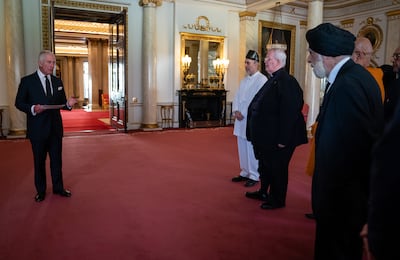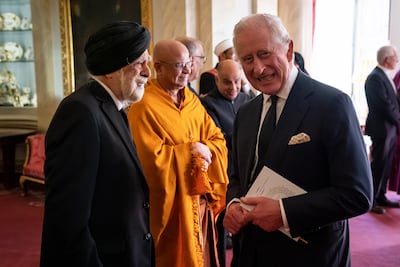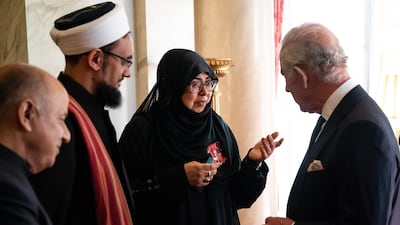The coronation of Britain's King Charles III will be a deeply religious affair when the Archbishop of Canterbury anoints him with holy oil and blesses him as the world looks on.
But in a modern monarchy many may wonder if he will break with tradition and include a variety of faiths as a nod to the UK’s diversity.
Meeting faith leaders in the Bow Room at Buckingham Palace on Friday, he was at pains to explain how he would both take the traditional oaths and keep commitments to other faiths.
“I have always thought of Britain as a ‘community of communities‘ [and] that has led me to understand that the sovereign has an additional duty – less formally recognised but to be no less diligently discharged,” he said.
“It is the duty to protect the diversity of our country, including by protecting the space for faith itself and its practise through the religions, cultures, traditions and beliefs to which our hearts and minds direct us as individuals.
“This diversity is not just enshrined in the laws of our country, it is enjoined by my own faith. As a member of the Church of England, my Christian beliefs have love at their very heart. By most profound convictions, therefore – as well as by my position as Sovereign – I hold myself bound to respect those who follow other spiritual paths, as well as those who seek to live their lives in accordance with secular ideals.”

Noting the value to society in diversity, he said he would cherish all who followed their conscience.
“The beliefs that flourish in, and contribute to, our richly diverse society differ,” he added. “They, and our society, can only thrive through a clear collective commitment to those vital principles of freedom of conscience, generosity of spirit and care for others which are, to me, the essence of our nationhood.
"I am determined, as King, to preserve and promote those principles.”
Ian Bradley, emeritus professor of cultural and spiritual history at the University of St Andrews and author of God Save The Queen: The Spiritual Dimension of Monarchy, believes the efforts King Charles makes will build on changes seen during his mother's long reign.
"To some extent the queen did, you just need to look at the way she reached out to other faiths, she made a particular point of visiting mosques, temples and synagogues and even in her Christmas broadcast she would reference other faiths and had a huge commitment to other faiths and tolerance," he said.
“I think the coronation will continue that, I think Charles influenced the queen. He will retain the oath of Defender of the Faith and defend the Protestant faith. But he will continue what the queen has done to position the monarchy to protect all faiths and get the Church of England to be a canopy for all faiths."

The queen was the first monarch to enter a mosque and Stephen Evans, chief executive of the National Secular Society, believes the king has equally shown an interest in Islam.
“King Charles has shown a keen interest in other faiths, I do not think he believes Christianity has a monopoly," he said.
"He is open to other faiths, he has shown a keen interest in Islam. In his first address he promised to serve all his subjects loyally and with love.
“The role of head of state is fundamentally tied up with being a religious leader."
Since the reign of Henry VIII, the King of England has held the title, Defender of the Faith, awarded in 1521 by Pope Leo X before the king broke away from the Catholic Church to divorce his first wife, Catherine of Aragon.
King Henry then declared himself Supreme Governor of the Church of England, a title that now passes to King Charles.


